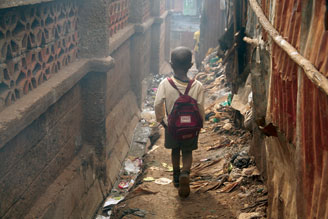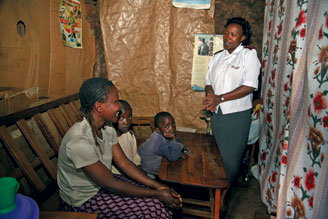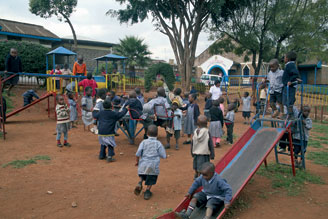 Home to more than a million people, Kenya's Kibera is one of the largest slum communities in the world. Located on the outskirts of Nairobi, Kenya's capital, the Kibera slum is densely populated (2.5 square kilometres) with the vast majority of its residents living in abject poverty. It's estimated that nearly 20 percent of the community is infected with HIV/AIDS, and that half of the population is younger than 15. One of these children is Graham, five, who lives with his mother and younger brother in a one-room, one-storey shelter.
Home to more than a million people, Kenya's Kibera is one of the largest slum communities in the world. Located on the outskirts of Nairobi, Kenya's capital, the Kibera slum is densely populated (2.5 square kilometres) with the vast majority of its residents living in abject poverty. It's estimated that nearly 20 percent of the community is infected with HIV/AIDS, and that half of the population is younger than 15. One of these children is Graham, five, who lives with his mother and younger brother in a one-room, one-storey shelter.
Kibera has thousands of these shelters built from clay, discarded wood, cardboard and corrugated iron. When it rains, the water often leaks through the roof and walls. Despite these horrible conditions, the people living in these shelters, such as Graham and his family, still have to pay rent to landowners. There is no electricity, drinking water or lavatories. With no healthy way to dispose of human waste, small plastic bags are used, tied up and then thrown away as far as possible. The small alleys between the shelters are covered with these “flying toilets” and other waste. The smell is unbearable.
Graham's mother Margareth, 30, is the sole caregiver for the family, as her husband died of AIDS in 2003. When Graham was born, Margareth tested positive for HIV. Her two sons are not infected, and Margareth hopes that her medication will keep her alive long enough to see her daughters-in-law and grandchildren.
 The Salvation Army operates a church and day-care centre in Kibera. Eighty children—the majority of them AIDS orphans—attend kindergarten classes. Each weekday, Graham walks with his little rucksack from home to school and back. His future is uncertain, as he, too, may become an orphan like many of his friends at school.
The Salvation Army operates a church and day-care centre in Kibera. Eighty children—the majority of them AIDS orphans—attend kindergarten classes. Each weekday, Graham walks with his little rucksack from home to school and back. His future is uncertain, as he, too, may become an orphan like many of his friends at school.
The Salvation Army compound contrasts with the filth of the surrounding community. When people walk through the yellow, red and blue gate, they step into a different world: everything is clean, quiet and peaceful. In 2007, the kindergarten classrooms were renovated and a play garden was established in the centre of the compound. In addition to the classrooms, the Army has a corps building, a humble residence for the officers and a vocational training centre where women can learn how to make clothes.
Margareth and most Kibera residents work in and around their homes. They try to earn a living with everything and nothing. In small shops and stalls, second-hand clothes, utensils and food are sold. During the day, the slum streets bustle with activity. At night, the streets are dark, dangerous and silent. In the late hours it is not wise to leave the shelters, because a human life is not worth much in Kibera.
 In her poor shelter, Margareth explains that her medication has to be taken with meals, but that she has not enough money to buy food. “I earn a little bit of money washing clothes for other people, but that is not enough to support my family. I'm grateful that The Salvation Army pays Graham's school fees and provides him with a meal at school. That means fewer worries for me, but I still have to care for his little brother. I need new mattresses because the ones we use now are wet and dirty because of leakage. There are times when I can't see the light at the end of the tunnel, but despite it all, I know that God cares for us.”
In her poor shelter, Margareth explains that her medication has to be taken with meals, but that she has not enough money to buy food. “I earn a little bit of money washing clothes for other people, but that is not enough to support my family. I'm grateful that The Salvation Army pays Graham's school fees and provides him with a meal at school. That means fewer worries for me, but I still have to care for his little brother. I need new mattresses because the ones we use now are wet and dirty because of leakage. There are times when I can't see the light at the end of the tunnel, but despite it all, I know that God cares for us.”
The Salvation Army does its best to help the people of Kibera, but this ministry relies on the financial support of donors in other countries. Captains David and Grace Musyoli, corps officers, remain committed to offering hope and a future to children like Graham. “Our faith in God and his Son, Jesus Christ, is the reason why we want to help the people in Kibera,” says Captain Grace Musyoli. “Our faith gives hope, despite the inhumane and almost hopeless situation in which people have to live. We testify about this hope in our church meetings on Sunday, but during the week we want to show it in a practical way.”
Top: A child walks through the Kibera slum; middle: Cpt Grace Musyoli visits with Graham and his family in their home; bottom: children play at the Salvation Army day-care centre in Kibera
Walking Gently Together
Tracy Desjarlais, Indigenous liaison, shares the importance of building bridges between the Army and First Nations.
Features“A handshake goes a long way,” says Tracy Desjarlais (Piapot First Nation of Saskatchewan), Indigenous liaison for public affairs and emergency disaster services (EDS) for the Canada and Bermuda Territory. “And to build trust within the nations, it’s important for us to be present.” As part of The Salvation Army’s commitment to establishing this
Read More
Singing By Heart
New music program creates space for joy, memory and worship for those living with dementia.
by Brendan Hill FeaturesSinging by Heart is a simple, yet powerful resource created for people living with dementia, built on the belief that music has a unique ability to reach the heart and awaken memory.
Returning to Our Roots
Is The Salvation Army still a church for the streets?
by Lieutenant Mirna Dirani Opinion & Critical ThoughtThe Salvation Army was founded to serve both worlds—body and soul—but over time, they can feel disconnected. Our corps can become consumed with maintaining programs, buildings and schedules. At the same time, our social service ministries often carry the load of engaging the community. If William Booth walked into one of our corps today, what would he see?









Leave a Comment